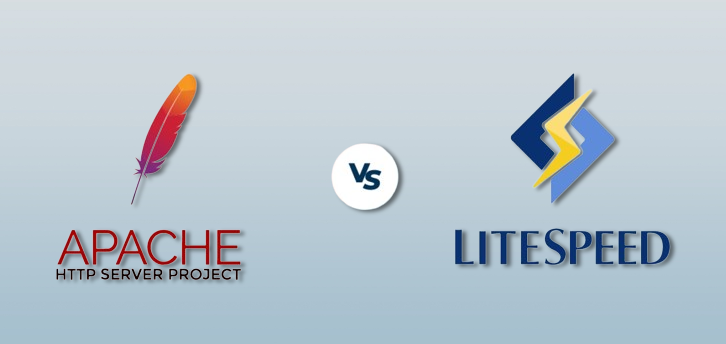- Domain
- Web Design
- Web Hosting
Webservers - what are they and comparison between Apache and LiteSpeed Webserver (LSWS)

Webservers - what are they - comparison between Apache and LiteSpeed Webserver (LSWS)
In this article, we will first discover what a Webserver is and then compare the two most famous among them.
What is Web Servers?
A web server is a software (it could be hardware too) application that serves as an intercessor between clients (usually web browsers) and web apps. Its main function is to handle incoming requests for web resources (like HTML pages, images, etc.) and serve them to the requesting client. Web servers play a pivotal role in hosting websites and making them accessible over the Internet.
What is Apache?
Apache is a free, open-source, and cross-platform (works on servers based on both Linux/Unix and Windows) web server software. It is maintained and developed by a community of developers under the Apache Software Foundation. Their goal is to create a robust, commercial-grade, featureful, and freely available source code implementation of an HTTP web server.
What is LiteSpeed Web Server (LSWS)?
LiteSpeed is a commercial web-serving software developed by LiteSpeed Technologies. An open-source variant exists under the name of OpenLiteSpeed (or OLS or OLSWS) but with limited features.
LSWS is marketed as the fastest web server focusing on speed and efficiency. It aims to be a drop-in replacement for the Apache web server so that server admins can switch to it easily from Apace. It also can 'pick' Apache configuration and its modules. This eases in migration of virtual hosts from Apache to LSWS.
LSWS is often praised for its superior performance, efficiency, and outperforming Apache in different scenarios. It is also more efficient than Apache on server load, memory utilization, and other resources consumption
LSWS - HTTP/3 Implementation and HTTP/2 Support
Currently, LiteSpeed Web Server is the only available production-grade web server with a reliable HTTP/3 implementation. For developers and agencies looking to be on the bleeding edge and serve their sites via HTTP/3, LiteSpeed is the only web server that can do it right now.
Similarly, they've been supporting HTTP/2 for as long as it's been available, and continue to make strides in efficiency and speed. In recent HTTP/2 benchmarks showing requests per second accessing WordPress, LiteSpeed's HTTP/2 implementation performed 10X faster than Nginx and 78X faster than Apache.
LSCache Support for WordPress
LiteSpeed Cache (LSCache) for WordPress is their popular WordPress cache plugin, with over a million active installations. It's an all-in-one acceleration plugin, with its signature feature powered by LiteSpeed Web Server's built-in server-level cache. This built-in cache simplifies the server stack and makes for a faster, more efficient way to serve content.
The LSCache plugin adds built-in PageSpeed optimization, image optimization service, critical CSS generation service, and third-party CDN integration, among other features. It also supports personalized WooCommerce cache as well as a highly configurable cache crawler, noticeably improving user experiences across all of your sites.
As far as community support is concerned, Apache has a large active open-source community in contrast with technical support provided by LiteSpeed Technologies.
Verdict
LiteSpeed is a clear winner when comparing these two software web servers. LiteSpeed is kilometers ahead of Apache when it comes to the performance side and the implementation of HTTP/3. They continue to make improvements to HTTP/2, and are making WordPress run more efficiently. Web Design Labs offer wordpress hosting packages with LSWS and cloud linux OS support
However, still, the choice between Apache and LSWS may depend on factors such as performance requirements, one’s own budget, and the familiarity of the user with open-source solutions versus commercial ones. Both servers have their strengths, and the decision should align with the specific needs of the web hosting environment.
Categories
Server/VPS/VDS (7)Web Hosting (17)Email (7)Billing (3)Website Design (4)Compliance (2)E-Mail Security (2)Client Portal (2)Domain Name Registry (3)Reseller Hosting (1)Most Recently Added Topics
How to Publish a Website on Linux and Windows Hosting: Step-by-Step GuideHow to remove unwanted e-mails from the server?What is the difference in linux and windows hosting What is DeepSeek?What is DNS_PROBE_FINISHED_NXDOMAIN Error and How to Fix ItE-Commerce Web Design in South Africa: A Complete GuideReseller Opportunities in South Africa: A Comprehensive GuideHow to Install WordPress Using Softaculous (DirectAdmin)How to Create an Addon Domain And Sub Domain In DirectAdminHow to Fix the ERR_CACHE_MISS Error
Call now to get more detailed information about our products & services.
Call Timings: 9am to 5pm UTC +2:00 (Mon-Fri).
24/7 email & Live Chat Support+27 21 825 9700 & +27 77 398 7047
 Copyright © 2026 All Rights Reserved
Copyright © 2026 All Rights Reserved
support@webdesignlabs.co.za
7 Jackson Crescent, Mountview, Lansdowne, ZIP 7740, Cape Town, Western Cape, South Africa

Other Links
Knowledge Base Contact Us Terms & Condition Disclaimer Usage Policy Refund Policy Privacy PolicyWeb Hosting
ASP.Net Hosting Email Hosting Free Web Hosting OpenCart Hosting Reseller Hosting Shared Web Hosting Windows Hosting Wordpress HostingServer & Internet Services
Virtual Private Servers ( VPS) Budget Dedicated Server Co-Location Internet Deals
 Top
Top
